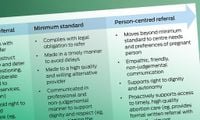In the wake of seismic shifts in abortion laws and reproductive health policy, medical providers across the United States and Australia are grappling with unprecedented challenges in delivering person-centred reproductive care. The Supreme Court’s 2022 decision to end federal abortion protections in the U.S. sent shockwaves through the healthcare system, deeply affecting not just patients but the professionals tasked with guiding them through critical reproductive choices. Meanwhile, in Australia, a growing body of evidence points to unprofessional abortion referral practices as another significant barrier undermining equitable access to care.
According to a November 2024 study published in Reproductive Health, the aftermath of the Dobbs v. Jackson Women’s Health Organization decision has left U.S. doctors, nurses, and reproductive health educators feeling increasingly conflicted and anxious about discussing and prescribing contraception—especially intrauterine devices (IUDs) and emergency contraception like Plan B. These methods have frequently been mischaracterized by anti-abortion advocates as equivalent to abortion, creating a chilling effect that extends well beyond the legal requirements of many states.
“I feel limited. I feel hurt. I feel powerless. I feel angry with the decision,” admitted one physician practicing in a state with abortion restrictions, as cited in the study. Echoing this sentiment, the same doctor added, “I feel like I can’t advocate for the patients I want to advocate for. I feel like I have to … be very careful with the care I provide, and the words I say, and what I document.” All providers in the study were cited anonymously to protect their identities, a reflection of the fraught environment in which they now work.
These emotional responses are not confined to the U.S. context. Globally, unprofessional abortion referral practices have been recognized as a major threat to person-centred abortion care, as highlighted in a perspective article published by Australian researchers in 2025. The authors argue that when referrals are handled poorly—through misinformation, judgemental attitudes, or unnecessary delays—they can cause significant distress and harm to abortion seekers. Such practices are not limited to those with conscientious objections; discomfort, stigma, or fear of repercussions can also lead providers to refuse or mishandle referrals, violating both ethical codes and, in many jurisdictions, legal requirements.
Australian guidelines are explicit: practitioners with conscientious objections must “inform the woman how to access the closest provider of abortion services within a clinically reasonable time” and “must not impose delay, distress or health consequences on a woman seeking an abortion.” Yet, as the research shows, real-world practices often fall short. Unprofessional referrals—such as rude communication, deliberate delays, or referrals to non-abortion providers—have been documented not only in Australia but internationally. These actions can delay care, increase costs, and even lead to denial of services, with cascading economic, educational, and emotional consequences for patients.
Back in the U.S., the legal and political pressure is taking a toll on providers’ mental health as well. The study in Reproductive Health interviewed 41 providers from 2022 to 2024, revealing a landscape marked by stress, alarm, and a sense of moral injury. Many providers fear legal repercussions for offering comprehensive reproductive health care, particularly in states where abortion is banned or heavily restricted. This fear has led some to adopt extra precautions—such as ordering blood tests instead of urine tests to confirm a patient is not pregnant before inserting an IUD—simply to avoid any risk of legal trouble.
“I do feel like I am a little more stressed and worried about repercussions or that I am going to do the wrong thing or get in trouble for putting in an IUD,” shared a nurse practitioner from a restrictive state. “There are some doctors that I am working with who have started doing [blood tests] instead of just a urine [test] to prove that they weren’t pregnant before they put in an IUD and those kinds of things.”
These anxieties are compounded by the Trump administration’s efforts, prior to its second term, to slash funding for reproductive health research and contraceptive care for low-income communities. Such policy changes have made it even harder for providers and patients alike to navigate an already complex and politicized healthcare landscape. The burden of these restrictions, as the study points out, is likely to fall most heavily on communities of color and other systemically-oppressed groups.
Meanwhile, the Australian perspective article calls for a rethinking of what constitutes professional abortion referral. It’s not enough, the authors argue, to simply refer a patient onward; the manner of referral is equally crucial. They propose a minimum professional standard: referrals must be timely, non-judgemental, and directed to high-quality, willing providers. This approach should comply with all legal requirements and, ideally, move towards what they term “person-centred referral”—a model that centers the needs, preferences, and autonomy of the abortion seeker.
Person-centred referrals go beyond the basics, facilitating access to timely, high-quality care in a friendly and empathic manner. For example, a provider might send a formal written referral with relevant clinical information or proactively contact the abortion provider to ensure availability. Such practices are rooted in trust, communication, and the empowerment of patients—key domains of high-quality reproductive care.
To bridge the gap between policy and practice, both articles highlight the need for systemic change. In Australia, this means professional bodies must articulate and enforce clear codes of conduct, medical education should include training on person-centred referrals, and health systems should provide accessible information about where to refer for abortion care. Government regulators, such as the Australian Health Practitioner Regulation Agency, have a responsibility to develop effective reporting and enforcement mechanisms for those who fail to meet their professional obligations.
In the U.S., the study’s authors caution against viewing contraceptive care as a panacea for abortion restrictions. While affordable and reliable access to contraception is essential—especially for marginalized communities—it cannot replace the need for robust protections of reproductive rights. Providers deserve to feel safe when delivering care, and patients deserve the information and autonomy needed to make decisions about their reproductive health without government interference.
“I do find myself feeling a little bit more fearful when a patient does leave without birth control and they don’t want to get pregnant,” one U.S. nurse practitioner told the research team. “I don’t know that it’s changed my counseling practices in general, but I feel like it’s changed the way I feel about birth control in that it’s allowed me to feel a little bit more biased because I am putting my fear on them subconsciously, I think.”
Ultimately, both the U.S. and Australian experiences underscore a common truth: professional, person-centred reproductive care is under threat from legal, political, and cultural forces. Ensuring that providers can deliver unbiased, timely, and respectful care—and that patients can access the services they need without judgement or delay—remains a pressing challenge for health systems on both sides of the globe.
As the debate over reproductive rights continues to evolve, the stakes for both providers and patients could not be higher. The path forward will require not just policy change, but a renewed commitment to professionalism, empathy, and the core values of patient-centered care.




